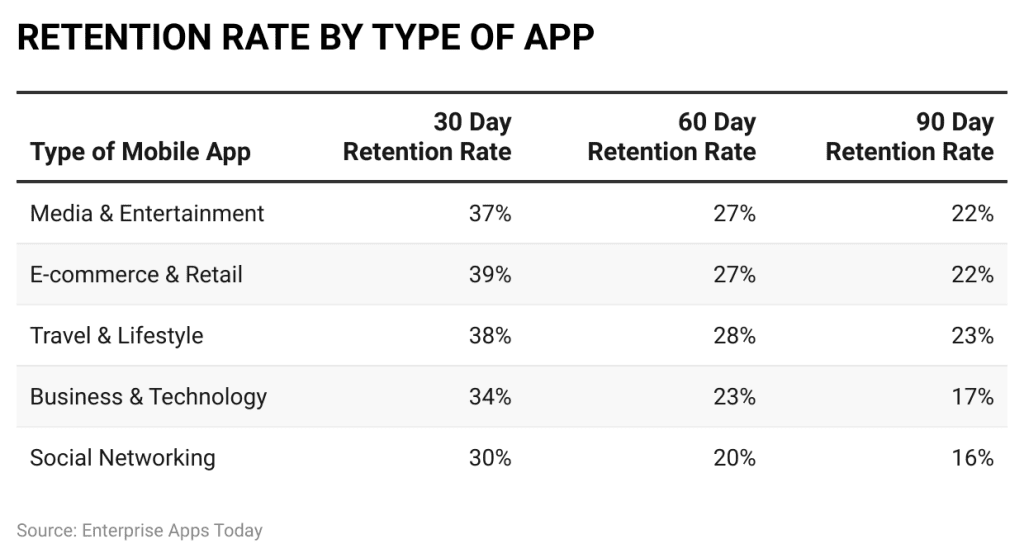
In today’s fast-paced digital landscape, mobile apps have become an essential tool for businesses across all industries. With the smartphone usage surge, consumers increasingly rely on mobile technology for everything from shopping and banking to entertainment and communication. This growing dependence on mobile devices presents a unique opportunity for businesses to engage with their audience more directly and meaningfully.
As we move further into 2024, the importance of having a mobile app cannot be overstated. By integrating a mobile app into your business strategy, you can stay ahead of the competition and meet the ever-evolving demands of today’s tech-savvy consumers. In this article, we’ll explore 5 reasons why your business needs a mobile app and how it can help you reach your business goals.
🚀 1. Better Customer Retention
In the highly competitive business landscape, keeping customers engaged is a significant challenge. With countless brands competing for their attention, customers have more options than ever before. Traditional engagement methods such as email marketing and social media posts can often get lost in the noise, making it difficult for businesses to maintain a lasting connection with their audience.
Mobile apps solve engagement challenges with features like push notifications and loyalty programs. Push notifications send personalized messages directly to users, keeping them updated on new products and offers, thus driving higher engagement rates. Loyalty programs in apps reward users with points, discounts, or exclusive access, encouraging repeat purchases and fostering brand loyalty. These tangible rewards create a compelling value proposition, making customers more likely to stay engaged.

Many businesses have successfully leveraged mobile apps to boost customer engagement and retention. For instance, the Starbucks mobile app is renowned for its effective use of push notifications and loyalty rewards. The app not only allows customers to order and pay ahead but also keeps them engaged with personalized offers and rewards for frequent purchases. As a result, Starbucks has seen significant increases in customer retention and sales.
📲 2. Increased Brand Visibility
Marketing is an essential component for promoting your company’s message to various groups of people. Building a strong brand image involves offering competent and high-quality services that ensure your presence in the marketplace. To achieve this, it’s crucial for your customers to consider your business as their primary go-to for their needs. The key to this success lies in the availability and accessibility of your company.
Mobile applications significantly enhance brand visibility by providing a constant presence at users’ fingertips. Having your app installed on their devices creates the impression of a personable, readily available, and frequently contacted entity in the market. This continuous presence reinforces your brand in the minds of your customers every time they unlock their phones or receive a notification.

Starbucks is a prime example of a brand that has significantly increased its visibility through its mobile app. The Starbucks app not only allows customers to order and pay ahead but also uses personalized push notifications and loyalty rewards to keep users engaged. This strategy has paid off, as the app boasts millions of active users and has been a key driver in the company’s digital sales growth.
💰 3. Revenue Generation
By integrating a mobile app into your business strategy, you not only enhance your accessibility but also create a lasting impression of a dynamic and customer-focused brand. This increased visibility ultimately leads to stronger customer relationships and sustained growth.
Mobile apps offer businesses diverse opportunities for revenue generation beyond traditional sales channels. By integrating strategic monetization tactics, businesses can not only enhance profitability but also foster deeper customer engagement and loyalty.
In-App Purchases
In-app purchases are a cornerstone of mobile app monetization strategies. They enable businesses to offer additional content or features for purchase directly within the app. This approach capitalizes on the convenience and immediate gratification that users seek, allowing them to enhance their app experience seamlessly. Whether it’s unlocking premium features, purchasing virtual goods, or accessing exclusive content, in-app purchases drive incremental revenue while deepening customer satisfaction and engagement.
Subscription Models
Implementing subscription-based models provides businesses with a predictable revenue stream. Subscriptions offer users ongoing access to premium content, services, or updates in exchange for a recurring fee. This model not only ensures continuous value delivery but also cultivates customer loyalty by encouraging regular use of the app. Businesses can tailor subscription plans to different tiers or durations, catering to diverse customer preferences and maximizing revenue potential.
By strategically leveraging in-app purchases and subscription models, businesses can effectively monetize their mobile apps while enriching user experiences and securing sustainable revenue growth.
📊 4. Effective Data Collection and Analysis
Traditional methods often struggle to capture real-time, detailed insights into customer behavior. In contrast, mobile apps streamline user behavior tracking and analytics by directly capturing comprehensive, real-time data from user interactions. Features such as session tracking, click-through rates, and in-app behavior analysis offer valuable insights into user preferences, engagement patterns, and conversion metrics. This rich data enables businesses to gain a deeper understanding of customer journeys and adapt strategies effectively.
The insights derived from mobile app data empower businesses to make informed decisions across various domains. By analyzing user preferences, businesses can optimize product offerings, tailor marketing campaigns, and enhance overall user experiences.
For instance, a retail app can use data analytics to identify popular products, optimize inventory management, and forecast future demand trends. Similarly, a healthcare app can utilize data to enhance patient care by monitoring medication adherence, tracking health metrics, and delivering personalized treatment plans.
🏅 5. Competitive Advantage
The Importance of Staying Competitive in a Fast-Paced Market
In today’s fast-paced market, maintaining a competitive edge is essential for businesses aiming to thrive and grow. Market dynamics evolve rapidly, driven by technological advancements and changing consumer expectations. Businesses that can adapt quickly and offer innovative solutions are better positioned to capture market share and outperform competitors.
How Innovative Mobile App Features Can Set a Business Apart
Innovative mobile app features can significantly differentiate a business from its competitors. These features not only enhance user experience but also address specific pain points or unmet needs in the market.
Sephora has successfully integrated augmented reality (AR) into its retail app through its Virtual Artist feature. This innovative tool allows users to try on thousands of products virtually, making the shopping experience highly interactive and personalized. As a result, Sephora has significantly boosted user engagement and retention by offering a unique and convenient way for customers to explore their products.

Similarly, Airbnb disrupted the hospitality industry by enabling travelers to book accommodations directly through their app, offering a seamless and personalized booking experience.
Mobile apps empower small businesses, such as local restaurants and boutiques, to implement loyalty programs, mobile ordering, and personalized promotions. These features enhance customer convenience and foster loyalty, allowing small businesses to differentiate themselves in a competitive market. By leveraging mobile technology, these businesses meet evolving consumer expectations and market demands effectively.
Final Thoughts
Developing a mobile app for your business paves the way for a stronger growth curve. Various companies – big and small – have increased revenue and improved customer relationships by launching apps to support their business. Whether you’re looking to boost customer retention through personalized experiences, optimize your revenue streams with in-app purchases , or gain deeper insights through data analytics, a mobile app provides the tools and platform to achieve these goals.
At YounetSocial, we specialize in developing custom mobile apps for businesses of all sizes and industries. Our team of experienced developers and designers works closely with our clients to understand their unique needs and create mobile apps that are tailored to their business goals and brand image. Contact us today to learn more about our services and how we can help your business succeed in the mobile-first world.